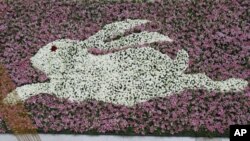Revelers from Beijing to New York are welcoming the Lunar New Year with fireworks, family reunions and hope for a better future. This is the Year of the Rabbit, or Hare, according to the Chinese Zodiac calendar. So what does that mean for love and life? VOA's Kate Woodsome asks Susan Levitt, a professional astrologer in San Francisco, California.
Hear Susan Levitt on the Chinese zodiac:
What can we expect from the Year of the Rabbit?
"There's such a huge difference between the gentleness of this Hare or Rabbit or "bunny" year, after Tiger, who has been so powerful. And we ain’t seen nothin’ yet, because Dragon is next year 2012, which will be extremely transformational and positive. So this wonderful, gentle time of the Year of the Hare, we can heal, transform, [use] diplomacy, be kind and pure with each other.
Taste and refinement are valued. Comfort is desired. Money can be made easily but also spent easily because the hare or rabbit loves beauty, luxury or artifice. Remember, Dragon Year 2012 will be very powerful, shamanic, a wild, exhausting time. So appreciate the small pleasures of this Hare Year 2011 as superb and somewhat rare opportunities to heal, relax, entertain, mend fences.
If relationships have been difficult, now would be the time to build those bridges again. Reach out, connect, heal. Make time for family gatherings and comfortable travel. Expect political compromise and diplomatic peacemaking on a global level. Discretion and persuasion are effective in a Rabbit Year, whereas force will not work."
In the Year of the Rabbit, are there any projects people should or should not start?
"For this year of the hare, there are five Taoist elements: fire, earth, metal, water and wood. This happens to be the year of the metal hare. And in feng shui, the metal aesthetic is clean, pristine. So clean your home, no clutter. This is not the year to put up all the art and all the things. Clean everything down and live minimally."
Listen to Susan Levitt's views on love and money:
Is that same principle applied to relationships? Should people not embark on new relationships, or clean up the ones they have?
"All of the above. Cleaning up everything - here’s our chance before Dragon Year hits and it becomes really out of control or amplified. Here’s our chance to mend and heal. And it’s a chance to embark on new ones. Especially if you are a hare, a sheep, a pig, a dog. It’s good for finding love and also if you have a relationship, for it to deepen and for you to have your small intimate circle. It’s time to regroup, re-heal and reconnect."
And what about money?
"Metal would be money and it’s still very bad. Because metal is an antagonistic relationship with hare’s earthly branch. Pinch pennies. Economize. Minimal, clean - all of that applies. Getting by with less.
Where do the animal signs come from?
"This is Chinese astrology. Basically, it’s Taoist astrology based on farmers, farmers’ almanacs. It’s thousands of years old… In the distant past, humanity’s relationship with animals was necessary to survive. When animals were domesticated, Taoist priests in ancient China observed the animal’s traits. The Taoist priests were both male and female. Over the centuries, the priests developed a system of 12 animals for the 12-year cycle. Human physical and temperamental attributes correlated with different years. This system became the 12 earthly branches. This is also associated with Chinese medicine. In the year 2637 BC, the Chinese Emperor Huang Di, the Yellow Emperor, standardized the Taoist calendar and it’s been in use ever since.
In the West, we think of the 12 astrology signs for every month. Starting at Spring Equinox with Aries, Taurus, Gemini, Cancer, Leo. But the Chinese system has 12 animal years. It starts with the rat: the rat who is smart, sharp, clever, intelligent. Then the ox: hardworking, a peaceful sign, integrity. Tiger: Power, dashing, daring. And now we go into rabbit: peaceful, harmonious."
Why is the Chinese New Year not celebrated on January 1, the universal new year?
"Chinese New Year is always the second new moon after winter solstice. It’s the lunar calendar, whereas in the west, we’re on the solar calendar starting at Spring Equinox. The western calendar starts on January 1st, the Gregorian year. The Chinese calendar basically started as agrarian, so it has nothing to do with January 1. With the Gregorian calendar, the months are all different lengths, it’s a pretty lousy one. But when you’re following a solar or a lunar calendar, it’s just simple. It’s the second new moon after Winter Solstice."




